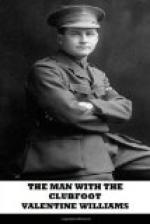It was ten minutes to twelve. A man in my position would in all probability make for the frontier. So, I judged, Clubfoot must calculate, though, I fancied, he must have wondered why I had not long since attempted to escape back to England. Duesseldorf was on the main road to Holland, and it would certainly be the more prudent course, say, to make for the Rhine and travel on to my destination by a Rhine steamer. But time was the paramount factor in my case. By leaving immediately—that very night—for Duesseldorf I might possibly reach there before the local authorities had had time to receive the warning to be on the look-out for a man answering to my description. If I could leave behind in Berlin a really good false clue, it was just possible that Clubfoot might follow it up before taking general dispositions to secure my arrest if that clue failed. I decided I must gamble on this hypothesis.
The railway guide showed that a train left for Duesseldorf from the Potsdamer Bahnhof—the great railway terminus in the very centre of Berlin—at 12.45 a.m. That left me roughly three-quarters of an hour to lay my false trail and catch my train. My false trail should lead Clubfoot in a totally unexpected direction, I determined, for it is the unexpected that first engages the notice of the alert, detective type of mind. I would also have to select another terminus.
Why not Munich? A large city on the high road to a foreign frontier—Switzerland—with authorities whose easy-going ways are proverbial in Germany. You leave Berlin for Munich from the Anhalter Bahnhof, a terminus which was well suited for my purpose, as it is only a few minutes’ drive from the Potsdamer station.
The railway guide showed there was a train leaving for Munich at 12.30 a.m.—an express. That would do admirably. Munich it should be then.
Fortunately I had plenty of money. I had taken the precaution of getting Kore to change my money into German notes before we left In den Zelten ... at a preposterous rate of exchange, be it said. How lost I should have been without Semlin’s wad of notes!
I paid for my coffee and set forth again. It was 12.15 as I walked into the hall of the Anhalt station.
Remembering the ruse which the friendly guide at Rotterdam had taught me, I began by purchasing a platform ticket. Then I looked about for an official upon whom I could suitably impress my identity. Presently I espied a pompous-looking fellow in a bright blue uniform and scarlet cap, some kind of junior stationmaster, I thought.
I approached him and, raising my hat, politely asked him if he could tell me when there was a train leaving for Munich.
“The express goes at 12.30,” he said, “but only first and second class, and you’ll have to pay the supplementary charge. The slow train is not till 5.49.”
I assumed an expression of vexation.
“I suppose I must go by the express,” I said. “Can you tell me where the booking-office is?”




